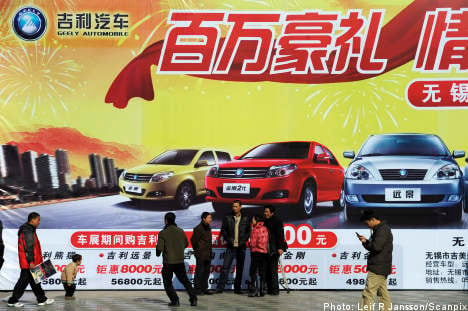The Zhejiang Geely Holding Group — based in Hangzhou, in the eastern province of Zhejiang — only launched its auto manufacturing business in 1997.
Chairman Li Shufu, who founded Geely in 1986, is an engineer by training. He ranked 123rd on this year’s Hurun Rich List of China’s wealthiest people, with a fortune of one billion US dollars.
Today, Geely is a fully integrated independent auto firm with total assets of more than 14 billion yuan ($2.05 billion). It has a workforce of 12,000 people, including 1,600 engineers.
It operates six car assembly and power-train manufacturing plants across China with a combined production capacity of 300,000 cars per year. The firm also owns nearly 500 dealerships and 600 service stations in the country.
Geely has an overseas sales and service network of nearly 300 outlets and runs plants in several foreign countries including Ukraine, Russia and Indonesia. Overseas sales have however totalled less than 200,000 units so far.
The firm claims to be the only Chinese car manufacturer to have developed its own range of engines — with eight variants sized between one litre and 1.8 litres.
Geely Automobile Holdings Limited, an arm of the group, is listed in Hong Kong. Shares were at 3.98 Hong Kong dollars late Wednesday, up 7.28 percent from Tuesday’s close on the news that a deal to buy Volvo from Ford was close.
Geely Automobile in September announced a $334-million investment from a private equity fund controlled by the US investment bank Goldman Sachs, in a step widely seen by analysts as raising cash for a Volvo bid.
The Goldman Sachs fund would end up with a 15.1 percent stake in the Hong Kong-listed arm if it fully converts the bonds and warrants into stock, the carmaker said in a statement.
Ford said in October that it had tapped Geely as the preferred bidder for its Volvo Cars nameplate and would step up negotiations with a consortium led by the Chinese automaker.
Geely said last month that it had reached an agreement with Ford to own the intellectual property rights to Volvo’s key technologies through its purchase of the loss-making Swedish badge.
Ford said on Wednesday that “all substantive commercial terms” of the Volvo sale had been settled and that “a definitive sale agreement” would be finalised in the first quarter of 2010, “subject to appropriate regulatory approvals.”



 Please whitelist us to continue reading.
Please whitelist us to continue reading.
Member comments